
In botany, a drupe is an indehiscent fruit in which an outer fleshy part surrounds a single shell of hardened endocarp with a seed (kernel) inside. These fruits usually develop from a single carpel, and mostly from flowers with superior ovaries.
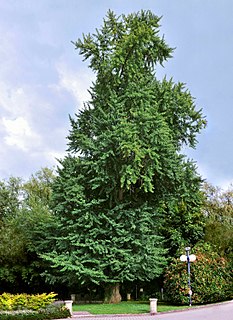
Ginkgo biloba, commonly known as ginkgo or gingko also known as the maidenhair tree, is a species of tree native to China. It is the last living species in the order Ginkgoales, which first appeared over 290 million years ago. Fossils very similar to the living species, belonging to the genus Ginkgo, extend back to the Middle Jurassic approximately 170 million years ago. The tree was cultivated early in human history and remains commonly planted.

Ginkgoales are a gymnosperm order containing only one extant species: Ginkgo biloba, the ginkgo tree. It is monotypic, within the class Ginkgoopsida, which itself is monotypic within the division Ginkgophyta. The order includes five families, of which only Ginkgoaceae remains extant.
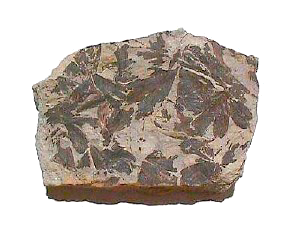
The Ginkgoaceae is a family of gymnosperms which appeared during the Mesozoic Era, of which the only extant representative is Ginkgo biloba, which is for this reason sometimes regarded as a living fossil. Formerly, however, there were several other genera, and forests of ginkgo existed. Because leaves can take such diverse forms within a single species, these are a poor measure of diversity, although differing structures of wood point to the existence of diverse ginkgo forests in ancient times.
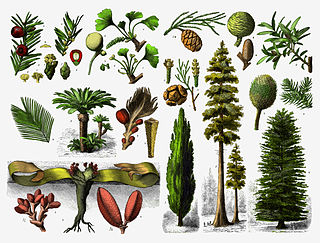
The gymnosperms are a group of seed-producing plants that includes conifers, cycads, Ginkgo, and gnetophytes, forming the clade Gymnospermae, the living members of which are also known as Acrogymnospermae. The term gymnosperm comes from the composite word in Greek: γυμνόσπερμος, literally meaning 'naked seeds'. The name is based on the unenclosed condition of their seeds. The non-encased condition of their seeds contrasts with the seeds and ovules of flowering plants (angiosperms), which are enclosed within an ovary. Gymnosperm seeds develop either on the surface of scales or leaves, which are often modified to form cones, or solitary as in yew, Torreya, Ginkgo. Gymnosperm lifecycles involve alternation of generations. They have a dominant diploid sporophyte phase and a reduced haploid gametophyte phase which is dependent on the sporophytic phase. The term "gymnosperm" is often used in paleobotany to refer to all non-angiosperm seed plants. In that case, to specify the modern monophyletic group of gymnosperms, the term Acrogymnospermae is sometimes used.

The ginkgo-toothed beaked whale is a poorly known species of whale even for a beaked whale, and was named for the unusual shape of its dual teeth. It is a fairly typical-looking species, but is notable for the males not having any scarring.

Bilobalide is a biologically active terpenic trilactone present in Ginkgo biloba.
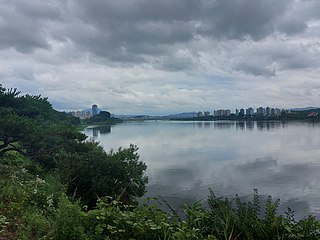
Yangpyeong County (Yangpyeong-gun) is a county in Gyeonggi Province, South Korea.
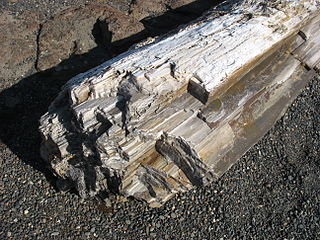
Ginkgo Petrified Forest State Park/Wanapum Recreational Area is a geologic preserve and public recreation area covering 7,124-acre (2,883 ha) on the western shoreline of the Columbia River's Wanapum Reservoir at Vantage, Washington. Petrified wood was discovered in the region in the early 1930s, which led to creation of the state park as a national historic preserve. Over 50 species are found petrified at the site, including ginkgo, sweetgum, redwood, Douglas fir, walnut, spruce, elm, maple, horse chestnut, cottonwood, magnolia, madrone, sassafras, yew, and witch hazel.

"Gingo biloba" is a poem written by the German poet Johann Wolfgang von Goethe. The poem was published in his work West–östlicher Divan(West–Eastern Divan), first published in 1819. Goethe used "Gingo" instead of "Ginkgo" in the first version to avoid the hard sound of the letter "k".
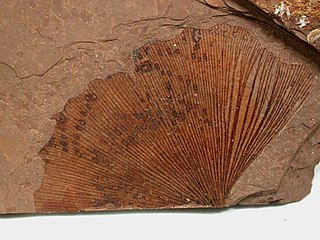
Ginkgo is a genus of non-flowering seed plants. The scientific name is also used as the English name. The order to which it belongs, Ginkgoales, first appeared in the Permian, 270 million years ago, and is now the only living genus within the order. The rate of evolution within the genus has been slow, and almost all its species had become extinct by the end of the Pliocene. The sole surviving species, Ginkgo biloba is only found in the wild in China, but is cultivated around the world. The relationships between ginkgos and other groups of plants are not fully resolved.
Koonwarra is a town in the South Gippsland region of Victoria, Australia. At the 2016 census, Koonwarra had a population of 404. The town straddles the South Gippsland Highway. Located around 128 km southeast of Melbourne, the town was served by rail from the 1890s until 1991 with the closing of the rail line to Barry Beach.

Ginkgotoxin (4'-O-methylpyridoxine) is a neurotoxin naturally occurring in Ginkgo biloba. It is an antivitamin structurally related to vitamin B6 (pyridoxine). It has the capacity to induce epileptic seizures.

Ginkgo adiantoides is an extinct ginkgo species in the family Ginkgoaceae from the Late Cretaceous to the Miocene.

Ginkgo CADx is a multi platform DICOM viewer (*.dcm) and dicomizer. Ginkgo CADx is licensed under LGPL license, being an open source project with an Open core approach. The goal of Ginkgo CADx project is to develop an open source professional DICOM workstation.
Deraniyagala's beaked whale is a species of mesoplodont whale.
The Uptown Monotones are an Austrian experimental/fusion band that formed in Graz in 1993. They became known to a wider audience through the talent show Die große Chance.
Ginkgo Bioworks is an American biotech company founded in 2009 by scientists from MIT and headed by Jason Kelly. The company specializes in using genetic engineering to produce bacteria with industrial applications. Ginkgo Bioworks is an analytics company that designs microorganisms for customers in a range of industries. It is the self-proclaimed "Organism Company" and was one of the world's largest privately held biotech companies, valued at $4.2 billion in 2019. It raised $290 million in September and $350 million in October of that year.
Palgwatang is a soup boiled with turtle's head and legs. Terrapin can be used as a substitute.

Bartheletia paradoxa is a species of dimorphic fungus and is the only member of the genus Bartheletia. Bartheletia is the only genus in the family Bartheletiaceae, which is the only family in Bartheletiales, which in turn is the only order in the class Bartheletiomycetes.














